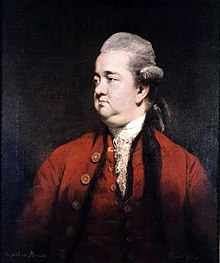
Back Edward Gibbon Afrikaans إدوارد جيبون Arabic جيبون ARZ Edward Gibbon AST Edvard Gibbon Azerbaijani Эдуард Гібан Byelorussian Едуард Гибън Bulgarian এডওয়ার্ড গিবন Bengali/Bangla Edward Gibbon Breton Edward Gibbon BS
Edward Gibbon | |
|---|---|
 Portrait by Joshua Reynolds, 1779 | |
| Member of Parliament for Lymington | |
| In office 1781–1784 | |
| Preceded by | Samuel Salt Edward Eliot |
| Succeeded by | Samuel Salt Wilbraham Tollemache |
| Member of Parliament for Liskeard | |
| In office 1774–1780 | |
| Preceded by | Harry Burrard Thomas Dummer |
| Succeeded by | Harry Burrard William Manning |
| Personal details | |
| Born | 8 May 1737 Putney, Surrey, England |
| Died | 16 January 1794 (aged 56) London, England |
| Political party | Whig |
| Education | Magdalen College, Oxford |
| Occupation | Politician |
| Profession | Essayist, historian, |
| Signature |  |
Edward Gibbon FRS (/ˈɡɪbən/; 8 May 1737[1] – 16 January 1794) was an English essayist, historian, and politician. His most important work, The History of the Decline and Fall of the Roman Empire, published in six volumes between 1776 and 1789, is known for the quality and irony of its prose, its use of primary sources, and its polemical criticism of organized religion.[2]
- ^ O.S. 27 April. Gibbon's birthday is 27 April 1737 of the old style (O.S.) Julian calendar; England adopted the new style (N.S.) Gregorian calendar in 1752, and thereafter Gibbon's birthday was celebrated on 8 May 1737 N.S.
- ^ The most recent and also the first critical edition, in three volumes, is that of David Womersley. For commentary on Gibbon's irony and insistence on primary sources whenever available, see Womersley, "Introduction". While the larger part of Gibbon's caustic view of Christianity is declared within the text of chapters XV and XVI, Gibbon rarely neglects to note its baleful influence throughout the remaining volumes of the Decline and Fall.